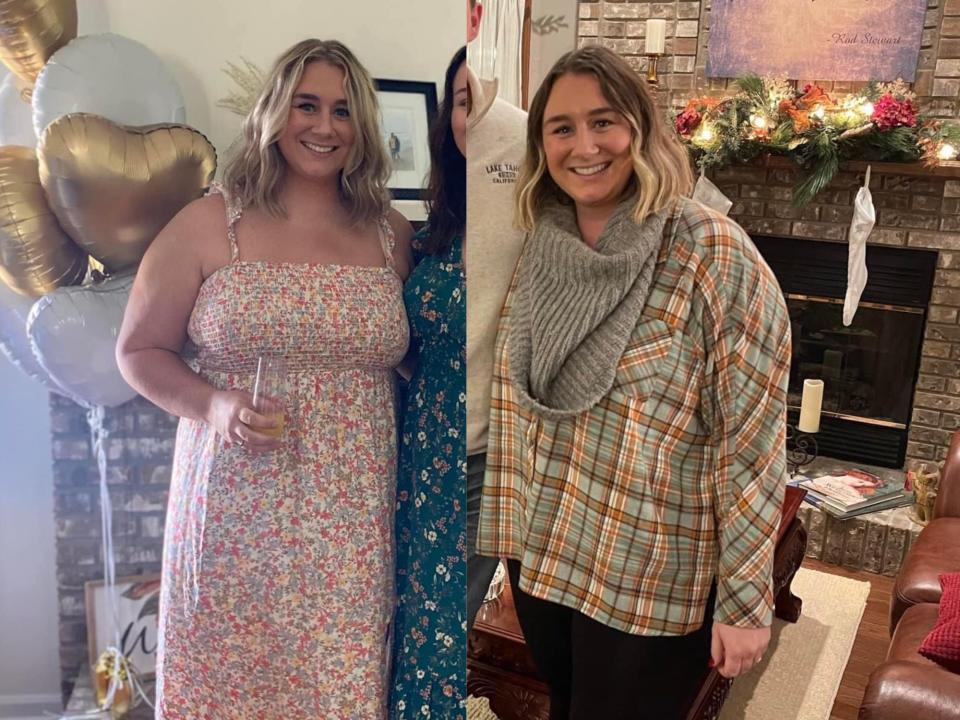A woman lost 55 pounds making 2 easy changes to her diet and exercise habits. Wegovy got her to 105.

Megan Tjelle lost 55 pounds by walking and eating healthy in a calorie deficit.
She then used the appetite-suppressing weight-loss drug Wegovy to shed another 50 pounds.
Tjelle, who has PCOS, has also regained regular periods for the first time in years.
Megan Tjelle was tired of missing out on life.
As her weight crept up over her 20s, she found herself declining social events because she felt self-conscious and noticed her health suffering, too.
She skipped pool parties because she didn't want to wear a swimsuit, broke a sweat curling her hair, and struggled to put on her socks.
Tjelle had been an athletic kid, but she started gaining weight as she became less active after joining nursing school.
"That coupled with the stress of nursing school, I coped by overeating," Tjelle, a 29-year-old from Chicago, told Business Insider.
While studying, Tjelle was diagnosed with polycystic ovary syndrome, which is linked to irregular periods and weight gain, and experienced plantar fasciitis, which can cause stabbing pains around the heel and arch of the foot.
After she graduated, things got worse. Tjelle had started a demanding career, and working night shifts as a nurse made it hard to develop healthy eating and exercise habits.
"It was getting to the point where I didn't even want to look at myself in pictures," she said. "I didn't want to be in pictures."
Tjelle tried fad diets, but they only made her weight fluctuate, leading her to gain back what she'd lost and more.
In October 2022, weighing 246 pounds, she decided enough was enough. Starting a new job with regular hours felt like the perfect opportunity to commit to getting healthier.
Tjelle made two changes to make the weight loss easier and more sustainable: She stopped relying on takeout, started eating a balanced diet in a calorie deficit, and gradually began moving more.
"That change had a huge impact on me, and I feel like that's the biggest thing that started my weight-loss journey, just because it allowed me finally to have normal eating hours, normal sleeping hours, and to sleep eight hours a night," she said.
Research has found that sleeping enough is key for weight loss, with one study finding that participants who were well rested tended to eat about 270 fewer calories a day.
The change also reflects the reality that the weight-loss mantra "eat less and move more" — a pillar of the $90 billion weight-loss industry — is easier said than done if a person isn't in the right circumstances.
Over six months, through diet and walking alone, Tjelle lost 55 pounds, and her health started to improve. Her plantar fasciitis, which she initially put down to her work, eased when she lost weight.
Next, she went on to lose another 50 pounds on the weight-loss drug Wegovy and got regular periods back for the first time in years.

While Wegovy and other drugs in the same class, known as GLP-1 agonists, haven't been approved by the Food and Drug Administration for PCOS, some women have reported their symptoms improving on the drugs, including their periods coming back. Research suggests there are strong links between PCOS and obesity, so it's a topic of interest for doctors.
Tjelle started small by just walking
Tjelle wasn't in the right mindset when she tried to lose weight in the past, she said.
"What was different this time was I was completely fed up, and I knew that it was kind of now or never, and it was time to fully commit to that change," she said.
Tjelle wanted her new lifestyle to be sustainable, so she started small. She committed to going to the gym every day but started out by just walking on the treadmill for half an hour.
She'd heard of the "12-3-30" workout trend, which involves walking on a treadmill at a 12% incline at 3 mph for 30 minutes. That was too challenging at first, so she started at a 2% incline and built up.
As Tjelle lost weight, she gained confidence and could feel herself getting fitter as she was able to exercise more.
"Looking back, it was really hard for me to walk into the weight section," she said. "I was so nervous, scared that everyone would be looking at me."
Over time, Tjelle moved on to resistance machines and running — she's now run a half-marathon and can do unassisted pull-ups.
Tjelle swapped takeout for healthy prepped meals
When Tjelle ditched takeout, she turned to a local meal-delivery service called Seattle Sutton, which provided three nutritionally balanced meals every day that put her in a gentle calorie deficit, which is required for fat loss.
It wasn't cheap, but Tjelle said she had been spending so much on takeout that she thought she still saved money.
"I just wanted something that would make it easy for me," Tjelle said.

Tjelle also stopped eating late at night and started having plain coffee with some milk, instead of the creamy, sugary versions.
"Cutting out the sugary drinks was huge for me," she said. "I didn't really realize how many calories I was consuming."
It wasn't easy to develop new habits, but she was so determined to lose weight, regain her confidence, and improve her health that she stuck with it.
'Food noise' saw her turn to Wegovy
But Tjelle still struggled with "food noise," meaning she was always thinking about eating — a common complaint of people who turn to appetite-suppressing GLP-1s.
"It's very hard to stick to a calorie deficit when you have cravings that are almost uncontrollable, and the food noise is constant in your head," Tjelle said.
It was that voice in her head that made her worry she wouldn't be able to keep losing weight naturally, would plateau, and eventually put the weight back on. After all, research has found that people who lose weight struggle to keep it off long term.
Tjelle heard that the weight-loss drug Wegovy, which contains the same ingredient as Ozempic, tended to silence food noise and had been linked to reducing symptoms of PCOS. Her doctor agreed that she should try it.
The food noise disappeared immediately, Tjelle said.
She started with a low dose and built up slowly. She experienced nausea — a common side effect — over the first couple of months, which faded over time.
While her appetite dropped, she continued eating healthy meals and ensured she was consuming enough protein to help her hold on to muscle while losing fat. GLP-1 patients are required to eat healthy and exercise when taking these drugs.
In the first six months of her weight-loss journey, Tjelle's rare and irregular periods became more frequent, and with Wegovy, they became regular.
People with PCOS can have insulin resistance, and GLP-1s can boost the production of and sensitivity to that hormone. Weight loss is also thought to help with symptoms such as irregular periods.
"When I started the Wegovy, that was the first time in my life that I started getting a regular menstrual period every month," she said. "Before, I had gone years without getting one."

105 pounds down, Tjelle takes a Wegovy maintenance dose
Fifty pounds and eight months down, Tjelle decided to move to a maintenance dose of Wegovy. She still takes a weekly injection but at a low dose and plans to keep doing so as long as her insurance covers it.
"I feel like a different person on it," Tjelle said.
Tjelle no longer has meals delivered but aims to eat the right amount to maintain her weight.
"I've continued all of the healthy habits," she said. "I don't count my calories, but I eat healthy most of the time. I still allow myself to have some different foods in moderation if I'm going out to dinner or if there's a dessert. So I don't restrict myself because I've done that in the past, and I still want to enjoy life, too."
People treat her differently now
Tjelle has been shocked — and saddened — that people treat her better now she's slimmer.
"People are nicer to you when you're in a smaller body," she said. "I just feel like people offer to do things for me more. People will hold the door, offer to carry things for me."
This is "thin privilege" and often remarked upon by people who lose weight.
Tjelle is also getting more attention from men, including ones who previously weren't interested.
"Guys that I have gone on dates with in the past, when I was more overweight, have reached back out to me," she said. "People that have ghosted me or didn't want to go on a second date, all of a sudden they're trying to talk to me."
But Tjelle's main takeaway is that she is more capable than she thought.
"I think I always knew that I had it in me, but I never truly believed in myself," she said. "I can't put limits on myself because I feel like now that I've lost that 100 pounds, I'm able to accomplish anything that I set my mind to."
She added: "I want to live to my full potential and be the healthiest and the happiest I can be."
Do you have a health story to share? Contact Rachel Hosie: rhosie@businessinsider.com.
Correction: April 24, 2024 — An earlier version of this story included inaccurate information about PCOS and obesity. There are strong links between PCOS and obesity.
Read the original article on Business Insider


